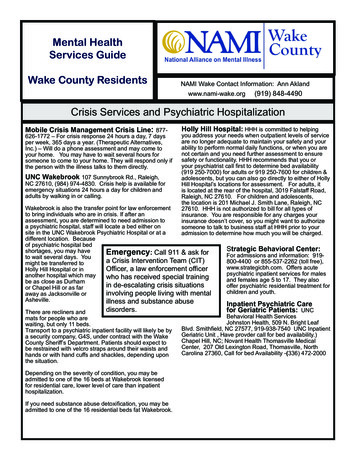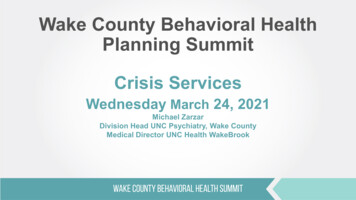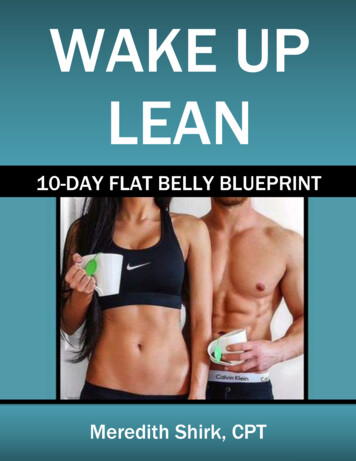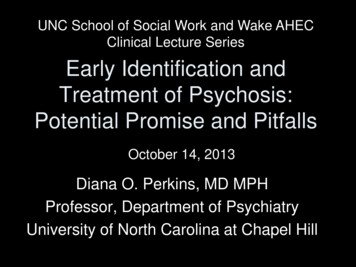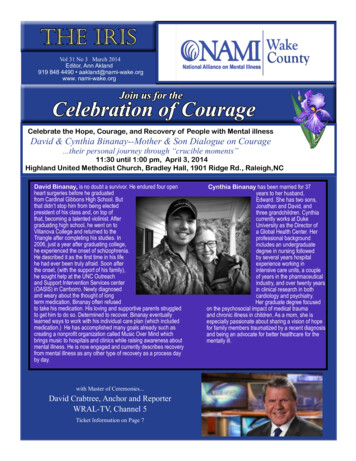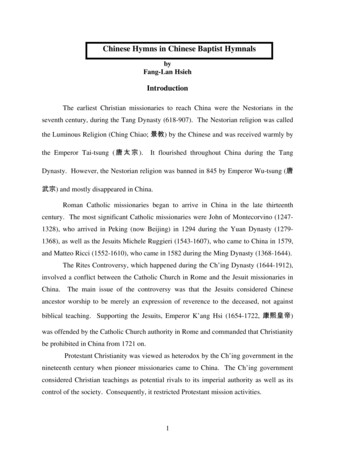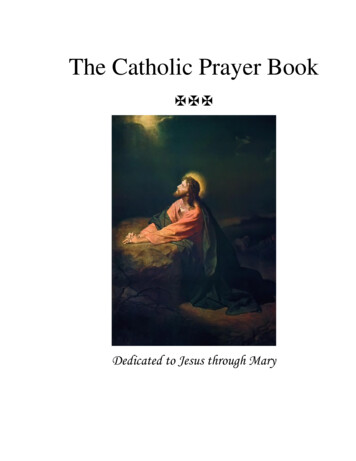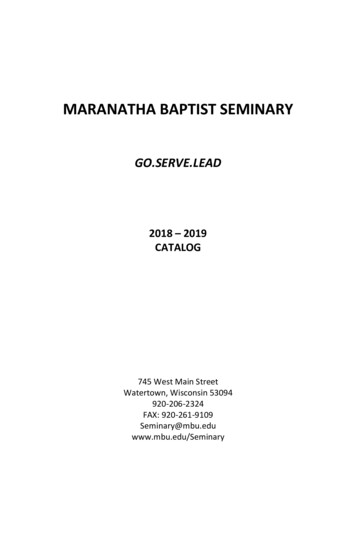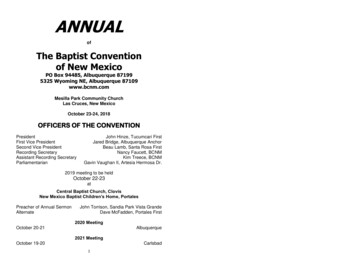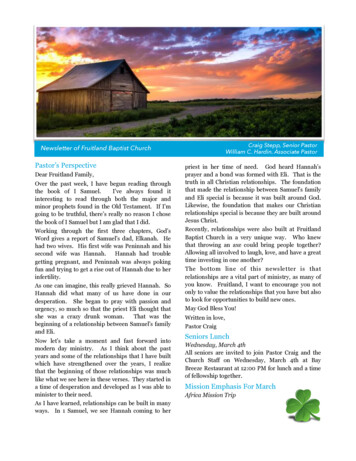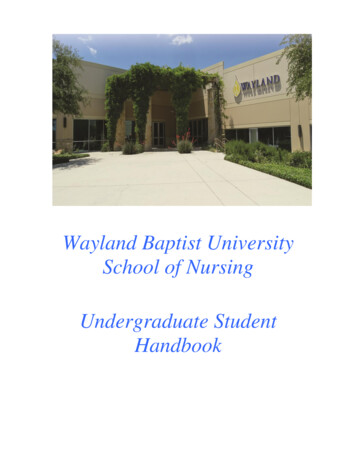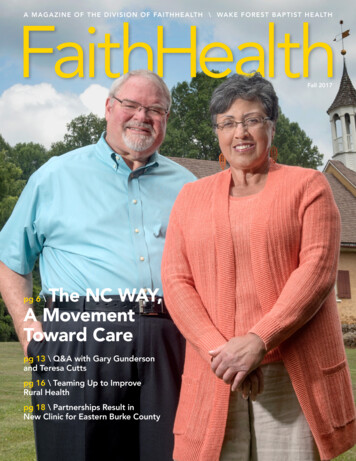
Transcription
FaithHealthA M A G A Z I N E O F T H E D I V I S I O N O F FA I T H H E A LT H \ WA K E F O R E S T B A P T I S T H E A LT HFall 2017The NC WAY,A MovementToward Carepg 6 \pg 13 \ Q&A with Gary Gundersonand Teresa Cuttspg 16 \ Teaming Up to ImproveRural Healthpg 18 \ Partnerships Result inNew Clinic for Eastern Burke County
FaithHealth3Contents \ Fall 20173The NC WAY6The NC WAY, AMovement Toward CareFIlling the GapA Community Solution / ThePeople's Solution18Partnerships Result inNew Clinic for EasternBurke County19FaithHealth Burke BuildsCommunity BetweenNeighborsBuilding a Community ofCare / Customizing CareRandolph County:Uncovering the Need,Discovering the Solution6AppFaithHealth and WataugaMedical CenterRobeson County Compassionfor U CongregationalWellness NetworkThe New Normal13Q&A with Gary Gundersonand Teresa Cutts1616Teaming Up to ImproveRural Health1718People and EventsNew HiresFaithHealth Fellows, Round 2Second Annual John HatchFaithHealth Lecture SeriesCover photo: Leland Kerr, Baptist Health liaison for Wake Forest Baptist, andAnita Holmes, FaithHealth contractor representing the General Baptist StateConvention, team up to combat some of the region’s health challenges.FaithHealth magazine is published by theDivision of FaithHealth, Wake Forest Baptist Health.
The NC WAYHappening Now, NC WAYBY GARY GUNDERSONThe way things work in NorthCarolina is as distinctive as itsbarbecue, basketball or how itswould lose the spacepeople practice their faith—not that what between the words. We callhappens to pigs and jump shots isn’tour model FaithHealthNC—religion, too. Here, faith and health haveno spaces. But we’re not the onlybeen woven as tightly as cotton threadone doing this. We call the varied otherfrom at least the time of the Moravians.ways the North Carolina (NC) Way.Those Moravians sent 14 menFor instance, you might expect adown the Shenandoah trail to settlehealth system in the eastern sands of thethe quarter-million acres of Piedmontstate, like Vidant Health, which is largelywilderness the crown had given them.based in Greenville, or SoutheasternOne of the men wasHealth in Lumberton,a German physicianto work with faithTHE NC WAY ISwho shared hisnetworks; they serveLIGHTING UP THEspirit of learning. Helarge numbers of smallIMAGINATION OFblended bleedingcommunities acrossHEALTH PLANNERSedge Europeanthe broad coastalACROSS THEmedicine — includingplain. You might notRELIGIOUS ANDactual bleeding withexpect, though, thatPOLITICAL SPECTRUM. the University of Northleeches — with herbalhealing techniquesCarolina system alsoof the Cherokee. The Moravians built aworks with faith networks, unless youvillage system marked by neighborhoodknow that Dr. John Hatch did his seminalwellness monitors, and they trainedwork with the General Baptist Stateclergy to accompany the medics. Today,Convention there, deeply imbedding intowe would say they were addressingthe system’s DNA an awareness of the“social determinants of health.” Homevast array of social assets in the lives of itsMoravian, the mother congregationpatients and communities. You may notof the regional province, now has aexpect Novant Health, with 15 hospitalsFaithHealthNC “connector” who isand providers in four states, to knowassigned from our Medical Center. Veryanything about spirit until you learn thatNorth Carolina.one of its initial hospitals, Charlotte’sYou’d expect a Medical Center calledPresbyterian Medical Center, virtuallyBaptist that displays a 35-ton Moravianinvented parish nursing in the region.star each year to figure out how to weaveYou might be less surprised thattogether faith and health so tightly itCone Health, started by a devout,community-minded Jewish textile family,has used parish nurses as communityhealth workers for decades. Or thatAsheville’s Mission Health, which nowincludes what was once known as St.Joseph Hospital, lives up to its name andinvests in building relationships with themountain congregations found in nearlyevery lane and hollow.You’d almost expect that CarolinasHealthCare, a sprawling system basedin Charlotte, would figure out thatin order to run a hospital in AnsonCounty, among the poorest in the state,it would have to build a network ofcongregational partners along the linesof the Memphis Model that connectsMethodist Le Bonheur Healthcare with600 congregations. You’d expect to findworkshops on FaithHealth at meetingsof the NC Hospital Association and aquiet stream of funding for FaithHealthefforts by the three major state healthphilanthropies.The NC Way is lighting up theimagination of health planners across thereligious and political spectrum. It’s rareto find a thought leader in our state whohasn’t heard about faith health work andwondered whether it might be part of theanswer for rural health, mental health,FaithHealth Fall 2017 \ 3
The NC WAYenrollment, charity care, transitions incare, Medicaid, hospital associations andpublic health. Those are only a few of thestatewide summits that have highlightedfaith and health on the keynote circuit.At its root, the NC Way is simple:Build partnerships with the socialstructures to give people a morereasonable chance of getting to the “rightdoor, at the right time, ready to be healedand not alone.”Of course, there are many ways ofaccomplishing that in this state, each asdistinctive as that of the Cherokee healersand the Baptists of a bazillion differentstripes. North Carolina has hundreds ofcongregations of nearly every faith in theworld. Every one of them brings its owndistinctive intelligence about healing.The state was settled by Moravians,Quakers, Waldensians, Hutterites, ScotchIrish and others, and it was indeliblyshaped by Africans, the Cherokeeand others who share ugly chapters ofcaptivity and torture, the remnants ofwhich still linger. The NC Way onlybecomes more complex and intricatelywoven as the nature of the threads grows.The state grew around threeindustries: textiles, tobacco andfurniture. These have nearly evaporatedin the past quarter century, leavinghundreds of small towns intact butwithout a way to pay the bills. The state,once an icon of stability, is now a posterchild for global economic formlessness,with social patterns continuing on themomentum of memory as we search fora new anchor.One thing the state has inabundance is education, marked at thehigh end by the original four membersof the ACC sports tribe: Duke, NCState, UNC and Wake Forest, three ofwhich have the key medical researchinstitutions. There are dozens ofothers: Davidson, East Carolina,Campbell, Shaw, state and communitycolleges, and some remarkableinstitutions you may not have heard of,like Piedmont International Universityor Fruitland Baptist Bible College. TheNC Way is to figure it out, and in the4 \ Fall 2017 FaithHealthmeantime, to build institutions of higherfiguring-it-out.The state and so many of our countieshave such low health status that you’dthink the system was designed to fail.That’s partly because it was designed tohelp those already successful to succeedjust one more generation. The NC Wayis to help any individual, but we stilltend to compete as groups, even if thattraditionally meant cutting off a fewrungs of the ladder needed by the youngof others. A map of the census tracts thatwere poor and unhealthy eight decadesago would look pretty much the sametoday, with a few semi-urban exceptionswhere technology or economicopportunity intervened.What would you hope for?If you were a loving God or thought likeone, what would your hopes be for thisodd and wonderful rainbow of nearly 10million people as they venture furtherinto the 21st century wilderness? Ifyou were looking for such a God, whatevidence would you look for? Perhapsthe living fibers of social connection toweave together faith, health, educationand politics in a way that leaves out noone and includes everything relevant tohealth. You’d have to turn off the politicalvolume entirely, like you might anannoying announcer, and pay attentionto those who are actually on the field.There you’d see things as unexpected,but entirely logical, as the radical witnessof the Conetoe Family Life Center, ledby Rev. Richard Joyner. You’d see a placethat exists in the imagination of peopledetermined to give youth something tosee other than drugs and poverty. Withlittle to work with beyond dirt and spirit,Joyner has made hope seem obvious.Determined to break the ugly cycle of“less than” relationships, he refused“helping” grants. Instead, he negotiatescontracts with Nash UNC Health Careand Vidant Health to buy produce fromConetoe’s community farm. The profitsflow into educational savings accountsfor youth in the community.The youth aren’t just borrowing hopefrom Joyner anymore. When HurricaneAT ITS ROOT, THE NC WAY IS SIMPLE: BUILDPARTNERSHIPS WITH THE SOCIAL STRUCTURES TO GIVEPEOPLE A MORE REASONABLE CHANCE OF GETTING TOTHE “RIGHT DOOR, AT THE RIGHT TIME, READY TO BEHEALED AND NOT ALONE.”
The NC WAYMatthew flooded the farm anddrowned the bee hives, youngpeople in the communityswarmed in to set up twice thenumber of hives in time forspring. They figured out how tofigure it out. Is this church workor community work? Joyner saysit’s human development as Godhad in mind.What are the signals that invokeand inspire trust in social systems thathave been bruised and calloused in theways of textiles, furniture and tobacco?North Carolina is distinctive inthe peculiar way religion works in apatchwork of small company towns.A 1976 landmark study, Spindles andSpires: A Re-study of Religion and SocialChange in Gastonia, by Don Shriver,Dean Knudsen and John Earle, lookedat the community where CaroMontHealth is now building its congregationalnetwork. The study detailed the complex“canopy” of values and practices thatdefine faith in company towns. Worthy ofbeing updated, the study highlighted howtricky it is for hospitals to distinguishthe work of health as mercy and justicefrom company benefits, like paying forpeople’s electric bills in December sothey can decorate their Christmas trees.The company pays the pastor, so whynot expect them to pay the parish nurse,too, and maybe provide a little decorativeeducation while they’re at it?But religion as an agent oftransformative mercy for the poor?Seriously? We are serious about just that,but it will take some unlearning to getthere.Even in state politics, where you’dbe embarrassed to expect it, you’ll findboth memory and hope of figuring itout. State offices have long histories ofworking at state and county levels withnetworks of everything mentioned above.Dr. Hatch’s students hold leadershippositions in offices across the state. Civilservants attend faith services just as othercitizens do, so it’s not hard for them tonotice the array of congregations—forexample, the thousands with the NCBaptist Convention, the Methodists orthe General Baptist State Convention.Rick Brajer, secretary of Health andHuman Services (HHS) under RepublicanGov. Pat McCrory, knew he would bereplaced under a new administration.Still, Brajer held a meeting after the2016 election to ensure that the quiet,multifaceted collaborations with faithnetworks would make a smooth transitionto the current administration. New HHSSecretary Mandy Cohen, MD, is pickingup the thread in much the same spirit,the NC Way.Accelerate and deepen theNC WayHow might one accelerate and deepenthe NC Way? After all, despite all itsassets, North Carolina is not much betteroff in terms of most health indicatorsthan its deep-South cousins. We havemostly up to go.Mainly, you’d want what is alreadyhappening to move faster. First you’davoid entangling the NC Way too muchwith the partisan delirium of Raleigh.You’d make sure the really big religiousnetworks were aligned. You’d use theextraordinary networks of educationthat are so distinctive to the state;their neutrality is as valuable as theirintelligence. People trust (and generallydon’t fight over) their local communitycollege. These are engines to pump smartscience and practical know-how into andthrough the networks of faith.What makes great and powerfulinstitutions humble enoughto be useful? Eye contact andheart contact with someonewho needs help. SociologistRobert Putnam could have beenwriting about the NC Way inhis 2010 book American Grace:How Religion Divides and UnitesUs. He noticed that two issues—butonly two—splinter along political andreligious lines. The NC Way focuses onthe fact that all the overheated schemeswe see dissolve into grown-up behaviorwhen people face a real person whoneeds compassion.There are the well-known fiery battleswith predictable divisions over sexuality,abortion and partisan identity. Faithgroups tend to vote very differently fromone another and have for many decades.But when a real need shows up with ahuman face, you’ll find wheelchair rampsgetting built without requests to seevoter registration or immigration papers.You’ll find someone willing to face downa pit bull and ignore perceptions of race,religion, bigotry or intolerance becausethe hospital said that patient needs his orher prescription.That’s the NC Way. While not quitethe norm, it’s not in the distant future. It’shappening now on some scale in everyone of the state’s 100 counties, in everyhealth system and in almost every groupthat worships.Gary Gunderson, MDiv, DMin, DDiv, is VicePresident of the Division of FaithHealth, Wake ForestBaptist Medical Center. He has worked extensivelywith the White House Office of Faith-Based andNeighborhood Partnerships, and serves as secretaryof Stakeholder Health, a group of health systemsnationally that are committed to more effectiveengagement with the poor in their communities.FaithHealth Fall 2017 \ 5
The NC WAYThe NC WAY, A MovementToward CareBY MELANIE RASKINThere’s an old Chinesesaying that goes likethis: “May you live ininteresting times.” Itspeaks to a world ofuncertainty and turmoil,divisiveness and fear.But interesting timesalso call forth courageand strength, a spiritof adventure and,yes, even optimism.Interesting times can inspire theputting aside of old disputes andnegative ways of being that no longerserve us, and shift the focus to synergy,creativity and harmony. Interestingtimes don’t just invite breaking, butbreaking open. You can’t circle thewagons when the very life of thecommunity you love is on the line.That’s just what’s happening in thehealth arena in North Carolina: Weare living in interesting times, andpeople are rising and shining. It’s calledFaithHealthNC (FHNC) . and it’s fastbecoming The NC Way.FaithHealthNC exemplifiesits name: it is a non-traditionalpartnership between faith and healthcommunities to harness the energy ofneighborliness and unity to decreasehospital readmissions and charitycare costs and improve overall healthand well-being. A person-centricrather than hospital-centric model, itleverages the volunteer and compassionpower of faith communities, workingalongside health care institutions, to getvulnerable patients in the right door forthe right care at the right time, ready tobe treated and not alone.6 \ Fall 2017 FaithHealthHow does this work duringinteresting times, in a state and climatethat are divided along so many lines,from political to economic to spiritual?Disparate ideologies notwithstanding,it is working. And it is because of thediversity, not in spite of it. That’s becauseof a simple truth: Everyone, no matterwhere they are on the ideologicalspectrum, truly cares about people whoare vulnerable and struggling. Whilethe lines in the sand can run deep andlong, FaithHealthNC rises above thecontention and easily and gracefullysteps over those lines. The distinctiveNC Way unites competing public andprivate organizations, hospitals, academicinstitutions, politics and faith walks inone universal calling: to help peoplewhen they need it most.Filling the Gap: TheAnswer Isn‘t AnotherAgency, It‘s theCommunityAccording to Jeremy Moseley, Directorof Community Engagement with FHNC,it’s a way of delivering care whose timehas come. “Despite innovations andadvances in a variety of support systems,more people are falling through thegaps in our communities. For whateverreason, people are not meeting thecriteria for health care system, socialand community services.” Yes, physicallimitations and diseases often preventpeople from getting what they need, butMoseley believes it’s bigger than that.FHNC is redefining the word “need” anddiscovering that it is more than a service
The NC WAYor technology. The answer isn’t anotheragency, it’s the community.“Technology and health careadvances are good,” Moseley explains,“but the human connection is missingnow. Some people don’t have the meansto plug in. And it’s not just the poor.People across the social, political andeconomic spectrum are living in isolationbecause of illness, a spouse who haspassed away or grown children who havemoved out of town. People need someoneto care. Our movement is about thathuman connection, following patientshome from the hospital, understandingthe social complexities of life that mayimpact their health care journey andworking with our partners — healthcare systems, nonprofits andcongregations — to relieve the burdensthey face, beyond the cancer or heartdisease that brought them into the health builders who reach out to congregationscare system in the first place. We aren’tand volunteers to create a system oflimited by diagnoses, demographics orsupport — and Supporters of Health, thefaith beliefs. We serve everyone. Ourcommunity health advocates who workonly limitation is geography — and we’refull-time in high poverty and at-riskworking on that.”neighborhoods. ServicesFaithHealthWE AREN’T LIMITED include: decipheringincubators are inhospital dischargeBY DIAGNOSES,action across the state:instructions and howDEMOGRAPHICS OR to take medicines;Asheville, Raleigh,FAITH BELIEFS. WEGastonia, Lumberton,transporting patients toSERVE EVERYONE.Kannapolis, Highdoctors’ appointments,Point, Charlotte,the pharmacy andWilmington, Wilson, Greenville,grocery store; providing safety/wellElizabeth City, Fayetteville, Goldsboro,being check-in calls and reminders aboutGreensboro, Durham and FHNCfollow-up care; helping create a saferheadquarters, Wake Forest Baptisthome environment conducive to healing;Medical Center in Winston-Salem.and liaising with health care resources toThe sites are powered by volunteersensure proper support.and supported by Connectors — theBut you can’t do any of those thingspart-time FHNC community networkwithout the key element of trust, saysFaithHealth Fall 2017 \ 7
The NC WAYTeresa Cutts, academic liaison forFaithHealthNC, faculty at WakeForest School of Medicine and one ofthe chief architects of the Memphismodel that inspired the formation ofFHNC. According to Cutts, trust canbe a big hurdle to jump because healthcare systems here as in other troubledplaces like the Delta where she grewup were often at the center of historicaltrauma in underserved neighborhoodsand communities of color.“They were part of the machinethat discriminated against,marginalized, experimented onand provided poor care to thesecommunities,” Cutts explains. “Theywere the sites of the eugenics program.These were the communities that sawtheir African-American hospitalsclosed down and their black doctorsmoved out. These health care systemswere also seen as the place people wentto die, often because patients waitedtoo long to seek care. It’s The NC Wayto heal the things that have happenedby naming and owning them, and thenmoving forward.”A Community Solution /The People’s SolutionAccording to Cutts, it begins with reallyhearing what the people of a communityare saying, and then, together, movinginto the space to begin to meet thoseneeds. Gone are the days when a hospitaltells a community what they needfrom a perch high above the streets.The NC Way inverts that pyramid, andembraces the community as partner andthe unpredictability that comes frompartnership. That’s a big reset.“The NC Way is
or Fruitland Baptist Bible College. The NC Way is to figure it out, and in the meantime, to build institutions of higher figuring-it-out. The state and so many of our counties have such low health status that you’d think the system was designed to fail. That’s partly because it
